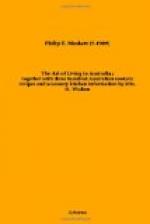Let us now go on to consider what ill effects result from the breathing of vitiated air. In his work, A Manual of Practical Hygiene, Professor Edmund A. Parkes has pointed out: “When air moderately vitiated by respiration is breathed for any period and continuously, its effects become complicated with those of other conditions. But allowing the fullest effect to all other agencies, there is no doubt that the breathing of the vitiated atmosphere of respiration has a most injurious result on the health. The aeration and nutrition of the blood seems to be interfered with, and the general tone of the system falls below par. Of special diseases it appears pretty clear that affections of the lungs are more common.” The volume of air inhaled and exhaled by the adult in the twenty-four hours averages 360 cubic feet, or 2,000 gallons, while the amount we take in the shape of liquid or solid food does not amount probably to more than 5 1/2 pints, which is equal to only 1-3000th part of the volume of air passed through the lungs. From this it will be seen how necessary it is that such a large amount of air should be perfectly fresh and wholesome, for the lungs act as a pair of immense sponges or absorbers. When the ventilation does not allow of a continuous supply of fresh air it smells close, and is surcharged with an increased amount of carbonic acid, while the noxious exhalations from the breath and lungs deposit themselves throughout the room. Nor are the ill-effects of impure air confined to man alone, for it is well known that cows, horses, sheep, and other animals, when penned up in close quarters, show an increased death-rate from many diseases.
But though it is perfectly plain that badly ventilated sleeping apartments tend greatly to the production of diseases of the lungs, it is not generally understood by the greater number of persons that diseases of the heart are brought on by similar conditions, and there is without doubt a great increase of heart diseases at the present time. It is estimated that upwards of 10,000 people in England alone die yearly from affections of the heart; yet, taking into consideration the ceaseless work of that organ (in the words of the motto upon Goethe’s ring, “Ohne Rast”—without rest), it is wonderful that it is not more frequently diseased. It is said that “the heart is a small muscular organ weighing only a few ounces, beating perpetually day and night, morning and evening, summer and winter; and yet often an old man’s heart nearly a hundred years of age is as perfect and complete as when he was a young man of twenty” (Haughton).




